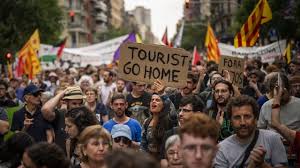
Introduction
The surge in popularity of Airbnb as a preferred alternative to traditional accommodations has prompted significant concerns in Spain. With millions of tourists flocking to the country annually, there has been a marked increase in complaints regarding holiday rental violations. These issues not only affect local communities, but they also raise questions about the need for stricter regulations in the booming short-term rental market.
Recent Events and Violations
In recent months, cities such as Barcelona, Madrid, and Valencia have witnessed a surge in complaints related to illegal tourist rentals. According to local authorities, around 30% of listings in these cities are believed to operate without the necessary permits. The rise in these unregulated rentals has intensified the demand for housing, leading to soaring property prices and gentrification in traditional neighborhoods.
In Barcelona alone, city officials have reported more than 10,000 illegal listings, prompting the government to increase fines for non-compliance and crack down on offenders. Furthermore, a landmark ruling in July 2023 in the regional court of Catalonia upheld the city’s right to enforce strict regulations on holiday rentals, allowing local governments to limit the number of properties rented for short stays.
Impact on Local Communities
The implications of these violations extend beyond just regulatory fines. Local residents in popular tourist areas have expressed frustration about noise disturbances, increased traffic, and the loss of community identity due to the influx of tourists. A survey conducted by the Federation of Neighborhood Associations in Barcelona revealed that 78% of residents felt their quality of life diminished due to the impact of holiday rentals.
Supporters of Airbnb argue that these rentals provide vital income opportunities for homeowners and bolster local economies. However, critics maintain that the rise in short-term rentals depletes housing stocks, making it challenging for locals to find affordable living options.
Conclusion
The ongoing battle between Airbnb holiday rentals and local regulations in Spain illustrates a growing need for balance between tourism and community welfare. As local authorities continue to implement strict measures to combat violations, the situation remains fluid. The outcome of these regulatory efforts could set a precedent for other tourist-heavy regions grappling with similar issues. It is essential for travelers and property owners alike to remain informed about compliance requirements to ensure that the vibrant culture and quality of life in Spain are preserved for future generations.




